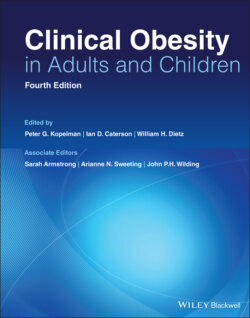Читать книгу Clinical Obesity in Adults and Children - Группа авторов - Страница 56
Infant diet quality and eating behaviors
ОглавлениеOne predictor of infant weight gain is infant feeding. In observational studies, having been breastfed at all or for a longer duration predicts a lower risk for subsequent obesity. In a meta‐analysis of 25 studies with a total of 226,508 participants from 12 countries, breastfeeding was associated with a significantly reduced risk of obesity in children (AOR 0.78; 95% CI: 0.74, 0.81). Categorical analysis of 17 studies revealed a dose‐response effect between breastfeeding duration and reduced risk of childhood obesity [89]. However, other data do not support a causal relationship between breastfeeding and lower obesity risk. It may be that infant growth predicts breastfeeding success, rather than the other way around, i.e. “confounding by indication” [90]. Furthermore, follow‐up of children in a large cluster‐randomized trial of breastfeeding promotion in the Republic of Belarus showed no intervention effect on anthropometric outcomes, obesity, or cardiometabolic risk factors through adolescence [91–93]. One should note, however, that all children in the Belarussian trial were initially breastfed, and the rates of obesity in the population overall were quite low.
Another group of investigators compared observational results from cohorts from high‐income with low‐ or middle‐income countries (LMIC), where confounding structures differ. They applied standardized approaches for assessing the confounding structure of breastfeeding by socio‐economic position to the British Avon Longitudinal Study of Parents and Children (ALSPAC) (N ≃ 5000) and Brazilian Pelotas 1993 cohorts (N ≃ 1000). Although a higher socio‐economic position was strongly associated with breastfeeding in ALSPAC, there was little such patterning in Pelotas. In ALSPAC, breastfeeding was associated with lower blood pressure (BP), lower BMI, and higher intelligence quotient (IQ), adjusted for confounders, but in the directions expected if due to socio‐economic patterning. In contrast, in Pelotas, breastfeeding was not strongly associated with BP or BMI but was associated with higher IQ. The authors concluded that reported associations of breastfeeding with child BP and BMI are likely to reflect residual confounding.
